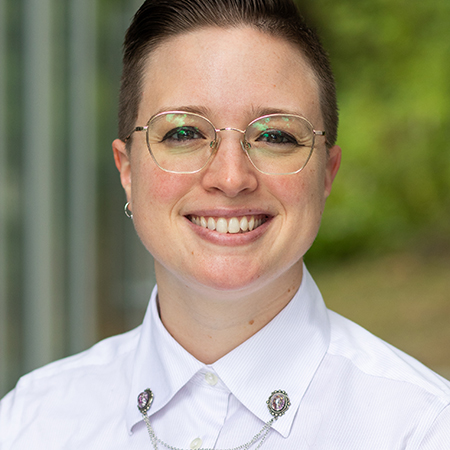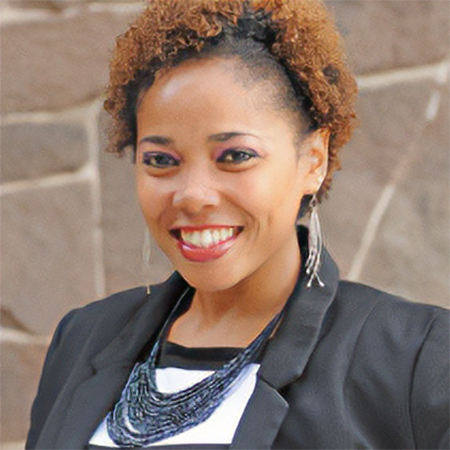
Leadership, People, & Organizations
Being a bold, people-first, smart leader is an invaluable skill you need in all stages of your career.
Good leaders help people change and develop in sustainable ways that bring out the best in themselves in the workplace and beyond. Our leadership, people, and organizations concentration provides students leadership training to be more effective and influential in working with others in diverse and challenging settings, ranging from small to large organizations. It’s a challenging, beneficial program that pairs well with our business administration degree, whether you aspire to be in a formal leadership role or not.
Through coursework, group projects, experiential learning, and presentations, you grow your ability to communicate, inspire others, lead an ethical decision-making process, lead in a diverse world with empathy, and influence and inspire others. Learning how to lead in all contexts will leave you particularly suited for roles in businesses, entrepreneurial ventures, family firms, nonprofits, creative agencies, and politics.
Where the Leadership, People, and Organizations Concentration Will Take You
Leaders and leadership experts are increasingly in demand in nearly every type of industry. When you learn about leadership and learn to lead, you gain invaluable skills that are applicable in numerous roles across a wide spectrum of companies and organizations.
Students develop awareness of their selves and others; learn effective influencing strategies to achieve measurable results; and discover how to work effectively with others to tackle organizational opportunities and challenges, and promote behavior in oneself and others that is respectful and inclusive.
Though not strictly a degree in leadership, students in this concentration often thrive in management and administrative roles, utilizing their interpersonal, decision-making, and negotiation skills to influence those around them. Students who partake in leadership training often rise quickly, take on greater responsibilities and challenges, and increase their impact and their value.
What You Will Study in Your Leadership, People, and Organizations Courses
The leadership, people, and organizations concentration includes core courses that cover topics such as negotiations, networking and career building, and diversity in the workplace. Plus, we offer a strong list of electives to enhance your education and expand your interests, including strategic decision-making, organizational leadership, project management, and opportunities for upperclassmen with real organizations as part of our Management Consulting Field Experience (MCFE) program.
Our concentrations are designed to help you specialize and explore interests within our bachelor's in business administration degree. The courses this concentration offers are comparable to what you will find in a bachelor’s of science (BS) degree in organizational leadership, a leadership development program, or other degrees in leadership.
Core Courses
You will choose a minimum of two course from our core class list, which includes:
Explore what it means to craft a career that’s meaningful and can sustain you over the course of your life. You will take an evidence-based, critical approach to designing, evaluating, and updating your career. You will use concepts, such as Entrepreneurial Thought & Action® and design thinking, and apply them to career development (for yourself and others) so your career choices can be meaningful and sustainable. The class, which is unique to the Babson leadership program, involves journaling, an intensive design workshop, a "hands-on" planning session with the Undergraduate Center for Career Development, and a final project to reinforce course concepts.
This leadership development program course will help you learn how to manage collaboration and networks for organizational performance and personal success. It will focus on ways in which successful leaders think about, analyze, and develop collaboration networks that help drive strategic advantage, innovation, and well-being in organizations. The course will also equip you with a range of network tools and frameworks that not only can make you a more effective leader and team member but also give you a competitive advantage in the job market.
This business leadership course explores how individuals think about and practice conflict resolution. Students will learn more about their own negotiating preferences and the consequences of the choices they make. The course requires both intensive involvement in negotiation and mediation simulations/exercises and thoughtful application of theory through class discussion and written analysis. Class materials will reflect a variety of contexts from the workplace, including interpersonal, global, and cross-cultural interactions.
Delve into materials that expose you to protagonists, contexts, and issues from multiple racial and cultural perspectives, and engage in activities designed to help you become more culturally competent. You will explore race and racism; examine the convergence of life domains and lived racial experiences; and investigate how race and racism intersect with lived experiences to influence privilege/bias, authenticity, and professionalism in the workplace.
- Building an Inclusive Organization
- Leader Development: Enabling Transformational Change in Yourselves and Others
- Talent Management: What Many Leaders Miss
Elective Courses
Our leadership, people, and organizations concentration offers additional options for you to expand your interests. Course offerings related to leadership are sometimes offered by other divisions across the College, including both in the business and liberal arts and sciences fields.
Options include:
Get ready to examine and attempt to answer the most fundamental of questions: Who am I? This course inter-mindles two approaches, as the questions asked and the answers derived will be informed equally by psychology and theater. You will see how each field informs, supports, and speaks to the other. Your own sense of identity is the central text in this course.
This course focuses upon grave human rights abuses and considers the increasingly blurred line between "peacetime" and "wartime" violations. It begins with philosophical, political, and legal definitions of human rights, then moves quickly to specific cases related to the impacts and legacies of imperialism and the resurgence of nationalism and white supremacy. You will examine challenges to international human rights law from military and technological developments, mass migration, and climate change, paying special attention to the role of art, literature, and film in addressing these challenges.
Gain a deeper understanding of how a strategic approach to "moonshot" innovations can solve significant societal challenges. You will explore several historical examples, focusing on the original and emergent strategies and technologies, the characteristics of successful teams, and the role of strategic problem solving.
This course draws upon the insights from the field of strategy, economics, decision making, and corporate finance and is suited for students interested in management consulting, investment management, or corporate planning. It focuses on how strategies are formulated and executed in specific competitive situations.
- An Irish Journey
- Be the Change: Evaluating Social Impact
- Business Presentations
- Communicating in Global Virtual Teams
- Critical Race and Indigenous Studies
- Entrepreneurial Families
- Ethics
- Global Health Innovation Lab
- Global Gender Politics
- Global Strategic Management
- International Consulting Experience
- Law, Ethics, Leadership in Sports Business
- Management Consulting
- Management Consulting Field Experience (MCFE)
- Mysteries, Puzzles, and Wicked Problems
- Project Management
- Retailing Management
- Strategic Decision Making
Explore more leadership, people, and organizations courses
You Will Learn From the Best
At Babson, our faculty are experts, innovators, and forward thinkers in their chosen fields. Here are just some professors sharing their expertise and support with our students in the leadership, people, and organizations program.
Have Questions?
Faculty Contact: Robert Bonnevie
Sponsoring Division: Management




